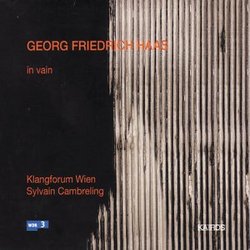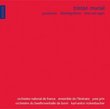| All Artists: Sound Forum Vienna, Cambrelin Title: In Vain Members Wishing: 1 Total Copies: 0 Label: Kairos Release Date: 11/1/2008 Genres: Jazz, Special Interest, Classical Styles: Experimental Music, Chamber Music, Instruments, Electronic Number of Discs: 1 SwapaCD Credits: 1 |
Search - Sound Forum Vienna, Cambrelin :: In Vain
 | Sound Forum Vienna, Cambrelin In Vain Genres: Jazz, Special Interest, Classical
|
Larger Image |
CD DetailsSimilar CDs |
CD ReviewsEthereal harmonic explorations that, while possibly overlong Christopher Culver | 05/26/2010 (4 out of 5 stars) "I had never heard of Georg Friedrich Haas before obtaining this Kairos release, but the Kairos label has provided so many pleasant surprises that I got the CD nonetheless. Haas is an Austrian composer born in 1953, but his output so far is comparatively small. This CD is completely dedicated to "In Vain" for 24 instrumentalists (2000), a single-movement work lasting just over an hour which has gained the composer some acclaim.
In listening to "In Vain", the most immediate comparisons are to Gyorgy Ligeti and Per Norgard. I've never heard any composer approach so closely Ligeti's "micropolyphony", those massive, highly complex clouds of sound where individual parts are lost in the amorphousness of the whole. What is reminiscent here of Per Norgard, namely that Danish figure's "psychedelic phase" of the 1960s, is the microtonal writing and the interference arising between incompatible spectra. "In Vain" is a work of oppositions. Two scales coexist during the piece, one equal temperament and the other based on the harmonic spectrum. The musical material itself constantly contrasts chords with descending runs. In live performance, there's the added contrast of passages played in total darkness without a conductor. There's really not much here in terms of melody or clear motivic writing, but the otherworldly tones are often thrilling. Even in this merely stereo recording, there's a fine sense of special effects, with glowing string harmonics being thrown back and forth across the ensemble like the famous brass chords in Stockhausen's "Gruppen". My only complaint about this remarkable work is that a single hour-long movement can prove exhausting. I find that I end up treating some portions here and there as sonic environments like Saariaho's "La dame a la licorne" or Xenakis' "La legende d'Eer" that the listener can freely tune and out of, rather than something demanding unbroken concentration. In live performance, the drama with the lights would probably sustain interest throughout. Still, I do recommend this to fans of new music, and it's great that the Ligeti and Norgard explorations of the 1960s have been taken up again and pushed further." |

 Track Listings (1) - Disc #1
Track Listings (1) - Disc #1


